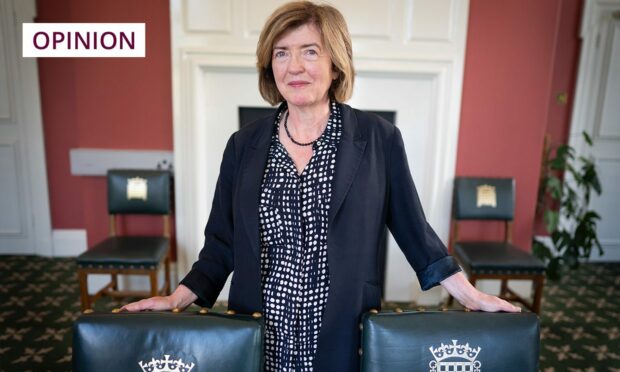Politics is often seen to be about little more than the pound in your pocket. Harold Wilson coined the phrase, the Yes campaign got schooled in its full meaning during the 2014 independence referendum.
It’s a funny old world in which Murray Foote, oft cited as the architect of “The Vow” when a newspaper editor, is the chief executive of the SNP. Not just because his appointment betrays a lack of imagination in the SNP and/or a lack of talent among those applying to run the party. Plenty of armchair pundits would have it that The Vow, the last-minute promise of extra powers for Holyrood, swung the referendum for No.
But surely more influential still was then Chancellor George Osborne’s unequivocal statement that the remaining UK would not share a currency with any independent Scotland, a stance backed up by Lib Dems and Labour? All three parties may have signed away their Scottish MPs at that point but, in getting voters focused on the literal pound in their pocket, they decisively shored up the union vote.
Still, it’s another P-word that influenced that moment and which has made the last few days in politics a crucial flexion point in the run-up to the next election: perception.
Having slashed government budgets without a care for the fabric of the state or the fate of those who depend on it, Scots could see that, whatever else he might be, Osborne was not a bluffer and he’d likely follow through on his pledge.
Of course, that decision to cut spending has come home to roost this week, as governments in London and Edinburgh wrestle with the fact that they’ve neglected school buildings too long, and some have suddenly become beyond use for fear of crumbling concrete.
That has had a profound impact on how Westminster education secretary Gillian Keegan is perceived.
From the next Margaret Thatcher to another Marie Antoinette
She was previously a politician Labour feared, largely because many in the party wished she was one of them. Raised on red Merseyside and starting working life as a teenage apprentice in a car factory before building a stellar business career, she could come out of Blairite central casting. Tories were comfortable comparing her to another female education secretary from a more humble background than her Eton-educated colleagues – Margaret Thatcher.
Yet, Shadow Education Secretary Bridget Phillipson bested her at every turn as the crisis unfolded over the weekend, and that perhaps led to Keegan being undone by an F-word: frustration. After an ITV interview on the issue of collapsing concrete, she too-soon launched into a profanity-infused whine about the lack of thanks she was getting and it was caught on camera.
Education secretary Gillian Keegan is recorded on camera saying others ‘have been sat on their a***s’ on schools Raac crisis and shares frustration about not being thanked for doing ‘a f***ing good job’https://t.co/c02gI4dXiM pic.twitter.com/jWbYTVZl5D
— ITV News Politics (@ITVNewsPolitics) September 4, 2023
In one bound, the perception of Keegan switched from the next Margaret Thatcher to another Marie Antoinette.
Voters might give a government wrestling with an engineering problem that dates to the 1960s the benefit of the doubt. But one that demands gratitude for the basic duty of ensuring kids in classrooms aren’t crushed by concrete is inviting electoral demolition.
It all adds up to a growing perception of a crumbling administration having to answer for poor policy choices, from austerity to Brexit.
And it could not have come at a worse time for Tory morale. For Keegan handed Labour attack ad material on the same day Keir Starmer gained a new chief of staff in Sue Gray.
Our perception can switch or stubbornly stick
Like Keegan, Gray didn’t attend a fancy school or uni. She started work as a teenager and forged a career in the civil service by being competent and personable. I don’t think it’s betraying any confidences to reveal that, some time ago, I had a conversation with her about the unpleasant toll that working on the partygate inquiry took on her and her family, but the details were not for reporting and she expected no sympathy.
I won’t be persuaded that she took on partygate for any reason beyond professional duty and service. The behaviour of Boris Johnson and his administration was his undoing, not Gray setting out the details of what that entailed.
As things literally fall apart around them, Tories shirk responsibility and cede agency and choose instead to attribute their misfortune to the magical powers of Sue Gray
Most Tories see it differently. They are convinced Gray has long been a Starmer sleeper in the civil service. They perceive her as someone far more nefarious and far more powerful than she really is. For too many in the Conservative Party, that clouds their thinking, blinds their outlook and erodes their morale.
As things literally fall apart around them, Tories shirk responsibility and cede agency and choose instead to attribute their misfortune to the magical powers of Sue Gray, a nice lady from Tottenham. That’s not a winning mentality.
How we perceive the world around us informs how we act. Our perception can switch or stubbornly stick, and it can be skewed. It’s perhaps not the best basis for politics, but it’s as unavoidable as it is powerful.
James Millar is a political commentator, author and a former Westminster correspondent for The Sunday Post
